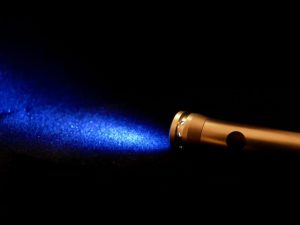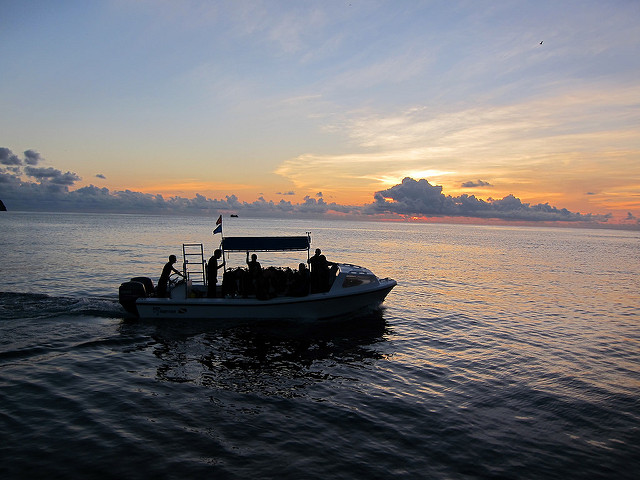 Diving at night can be intimidating to new and novice divers, but did you know even the most experienced divers feel a little spooked out. You’re curious and once you take that plunge into the darkness it’s like the curtains are drawn open and now you have a brand new scene.
Diving at night can be intimidating to new and novice divers, but did you know even the most experienced divers feel a little spooked out. You’re curious and once you take that plunge into the darkness it’s like the curtains are drawn open and now you have a brand new scene.
Everything looks significantly different at night. The day creatures have already gone into hiding and now the nocturnal creatures slowly creep out and stalk the night looking for its usual prey.
In this article, I’ll be giving you important night diving tips for new and novice divers, a great night communication video to watch, and communication tips for diving in the dark.
Night dives are a lot more fun and actually very peaceful when you’re relaxed and feel comfortable. I remember when I first did my night dive, in fact, I didn’t sleep very well the night before BUT I can honestly tell you though from the very moment I took that first giant leap into the ‘semi-dark water’ it was the most exhilarating experience ever. You will see more exciting, weird breath-taking sea creatures in colours so vivid that it will make you want to do night dives for ever.
So here’s the thing… when you dive during the day, you’re excited when you see a crab, a lobster or an eel but you only get to see part of them, you don’t get to see their entire body because they hide in the daytime.
What might you see at night?
Did you know that some very tiny zooplankton when threatened will emit miniscule thick chemicals that glow radiantly blue in the dark?
The first time I saw this mysterious phenomenon at night, I closed my eyes thinking I was seeing things and when I opened my eyes they were still there, completely surrounding me.
What makes all this really amazing and is like a diver’s paradise, is some dive destinations have giant manta rays come at night to the diver’s site. They seem to know the zooplanktons are attracted to the divers lights and so they also swarm in gracefully to take in their feed.
2) When you dive during the daytime, you’re probably thinking the hard coral is not alive. Try diving at night and you’ll be surprised and entertained at how lively they are when you see their coral polyps with the soft tentacles scooping up the zooplankton.
 3) You will rarely see lobsters out in full form in the daytime because they’re always hiding in crevices. You can see them but they won’t come out. Dive at night and watch them crawl out and hunt fish, clams, crabs and sea urchins.
3) You will rarely see lobsters out in full form in the daytime because they’re always hiding in crevices. You can see them but they won’t come out. Dive at night and watch them crawl out and hunt fish, clams, crabs and sea urchins.
4) Moray eels hide during the daytime too and the only thing you’ll see in the daytime is their head poking out and their mouth open. At night you’ll see them swim by you and be intimidated by their sharp teeth with their mouth still open. Don’t sweat it, this is how they breathe!
4) Octopuses are shy creatures, and not having an external shell or internal skeleton, their first impulse is to hide. They’ll come out at night to hunt and instantly change its colour to their surroundings. Predators get confused when they get ejected with ink.
What I recommend
Night diving takes place when it’s dark and mostly refers to recreational diving. Divers go underwater to see the mysterious behaviours of these nocturnal creatures.
Because there are many hazards associated to night diving, it’s highly recommended divers take an Advanced Course or PADI’s Night Diver Course to enhances their dive skills in addition to doing night dives under the guidance of professional instructors. The only prerequisite you need to have is the Open Water Dive Certification.
What should your boat captain have ready for the night dive?
Before you go night diving, make sure your boat captain has a light attached to the buoy or the anchor line AND a light on the boat. This will help you and your dive buddy locate the boat in the event you get separated from the dive group.
So… you want to go night diving do you?
First, remember this RULE: Never shine your night light into a diver’s eyes as this can temporarily blind him.
Important Tips For Night Diving
1) Unfamiliar Dive Gear
Never do a night dive with gear you’re not familiar with.
The last thing you want in your night dive is to be struggling with your buoyancy. You need to know your required weights to achieve neutral buoyancy ahead of time and trying to figure that out at night underwater will be disastrous to you and your buddy. Struggling with your buoyancy and trying to find your inflate and deflate buttons means you’re already not focused on your dive and you could lose sight of your buddy, become disorientated and not even pay attention to your depth.
Not only is it important to be familiar with your gear and the amount of weights required, you and your buddy also need to know where everything is located on each other’s gear. Be prepared and organized the way you would with your day dive. A great way to do this is to do a pre-dive inspection with your buddy prior to the night dive.
Some years ago, I purchased a new BCD and new wetsuit at the same time and much to my surprise I ended up having to wear a total of 27 lbs of weight. Prior to that purchase, I had done well over 500 dives and only needed 6 lbs. That first dive with new gear was a total nightmare and I was glad I didn’t do a night dive with them on until I was able to reduce my weights.
2) Be familiar with the dive site in the day time.
Ask the dive centre for the dive locations of their night dives and then book to do the dives in the day time. Doing the dive in the daytime gives you the opportunity to orientate and navigate yourself around. Make sure you have an easy entrance into the water and exit out of the water at night.
Your night dive is usually not far from the boat and not deep so you’ll have plenty of time to explore.
It’s vital to be in control and have nothing disturb your night dive. For example, you don’t want to be diving in currents at night.
 3) Night lights and other accessories.
3) Night lights and other accessories.
It’s crucial to have good working night lights and just so you know, most light source underwater will give your 5 to 10′ depending on the environment.
You will need a reliable and long lasting primary light and a backup light. The primary light should be brighter and larger, enough to get you back to the boat while the backup light can be small enough to put in your pocket.
If your primary light fails and you don’t have a backup light, here’s what can happen…
Hazards:
- Disorientation
- Anxieties
- You won’t know how you’re doing on your buoyancy
- You might not know which button to push on your computer to get the reading on your depth and air pressure
- May get separated from your dive group
- Difficult for your dive buddy to find you
If your primary light fails, let your dive buddy know, abort the dive and you and your buddy return to the dive boat.
You need to know how to use both lights and the batteries should be new and fully charged. The primary light needs to last the entire dive. I find most night lights will sink and are negatively buoyant so don’t expect them to float if you accidentally release it from your hand. The lights need to have either a wrist strap or a lanyard attached to them. It’s easy to get distracted and let go of the light when it comes to picture taking so all the more reason you want that strap around your wrist.
The backup light can be stored in the side pocket of your BCD.
When looking around for some good night lights, the best thing to do is try them out. Hold it in your hand. You should be able to get a good grip on the light and check out the width of the brightness, test and see how long the battery lasts and most importantly, you need to check the depth rating of that light.
Having a whistle is very handy especially if you and your buddy surfaced far from the dive boat. Find a whistle you can also use underwater to get the attention when needed.
4) Communication with your dive buddy.
You and your buddy need to decide how to communicate underwater prior to entering the water. If you lose your buddy, stop and get vertical and shine your light outward as you do a 360 degree turn. Chances are your buddy will spot you as he does the same. Another thing you can do is to cover your light beam with the palm of your hand and you should easily see his beam glow.
If you’re far away from the boat after you surface, shine your light at the boat until someone on the boat sees you and don’t forget to blow your whistle. Once someone on the boat responds, shine the light on your head so they can get a good vision on you.
You and your buddy should always dive closely together. When there are other divers close by, it’s easy to get confused and you may end up diving with another diver who you think is your buddy. You may not know this until you surface and realize this. Communicating underwater is already a challenge even in daylight and is done with hand signals. At night, you can’t see the hand signals without the light shinning on them.
Here’s what you and your buddy can do with your own night light:
OK Signal
Put a circle around your buddy’s light beam and your buddy must acknowledge returning a circle.
I’m Not OK
Wave your light from side to side. This lets your buddy know something is wrong and you need attention.
Get Your Buddy’s Attention
Move the light up and down.
Look At This
Circle your light beam around your dive buddy’s beam as if you’re lassoing it and then ‘drag’ it to where you want him to look.
Let’s Go This Way
Flicking the light in a direction means go this way and the buddy acknowledges the same.
Passive Communication
You may not be able to see your buddy but you should see his beam and know where he is which will also allow you to observe his beam movement.
How Much Air Do You Have
Once you get your buddy’s attention you can also put the light to your hands and give hand signals to show how much air you have left.
5) Before the sun sets.

The perfect time to go underwater is just before the sun sets. This gives you time to set your gear up properly on the tank, time to suit up, spend time with your dive buddy doing your pre-dive inspection, and get your eyes adjusted to the darkness. You don’t want to forget anything and enter the water without your night lights. It’s also a great time to calm your nerves if you’re new to night diving.
All right, go out and enjoy your night dives and I hope I gave you helpful information. You might feel some anxiety still and that’s ok because that will keep you focused. If you have any questions or comments or have had a chance to do some night diving and want to share your experiences, I really would like to hear from you. Please put them in the Comment Box below.

Hi these are great tips.
I have done a lot of diving but I am still yet to take my first plunge and do my first night dive. It think the thought of plunging in to the black abyss just sets me on edge.
Your tips on managing the anxiety and how to be more comfortable when night diving really help fill me with confidence. I am heading to the Florida keys next month to do some diving, I will definitely look into doing some night dives while I am there!
Hi Steve,
Thank you for your wonderful comment. I find the best way to start off on any night dive is to be on the dive boat before the sunset. This gives you time to set up your gear on the tank, do your pre-dive inspection and communication method with your buddy, and it’s important to know you have the right amount of weights on you, etc. Of course, making sure you have good primary night light and a backup light. You also have enough time to calm your nerves. Dive with the accompany of other divers and staying close to them and your buddy makes a world of difference. Remember to breathe… you’ll be in awe at how different it is, the colours, even the hard corals…vibrantly alive…
PADI also offers a Night Dive course as part of their Adventure Dive specialties which is excellent.
Enjoy your night dives and please let me know your experiences of it.
Regards,
Monica
Diving at night sounds great and the pictures look amazing.
There’s one thing that would prevent me from doing this. Sharks. They scare the living piss out of me. Shortly before a trip I took to Hawaii, I read about the best ways to avoid them and one of the top tips is to avoid the water at night. Do you have any precautions for avoiding them while night diving?
Hi Dustin,
Thank you for your great comment and great question.
While it’s true sharks hunt at night, they’re still very shy creatures and reserved. They’re not interested in humans for food. Having said that, we need to be cautious. My advice would be to find out what types of sharks are in the area which will help you decide if you want to do the night dive. If you do the night dive stay close to other divers and you and your buddy should always dive close anyway. Keep still, keep breathing and both of you slowly back away towards any reef or rocks as cover if you feel threatened.
The other thing you can do is do some researching on sharks and you’ll be amazed to find how shy they are.
Night diving is one of my favourite types of diving and sometimes I see sharks but they don’t pay any attention to divers, they already know what they’re looking for.
Kona, Hawaii is a great place to do night diving to watch the giant manta rays. Check my article … and watch the video.
https://joyofscubadiving.com/t…
Don’t deny yourself the joy of scuba diving especially if diving is your passion.
Thanks!
i agree about the “a lot of hazards” when scuba diving a night.
This is one of the scariest things, especially if you are not familiar with diving as such. First of course, familiarize yourself with swimming at day since at least if you panic, you can find water surface easier.
Great read!
Hi Alex, thank you for your great comment. Yes, it’s always a good idea to familiarize the dive site during the daytime. Another way to tone down the ‘jitters’ is to be on the dive boat before the sunsets which gives plenty of time to setup your dive gear, plan the communication and pre-dive inspection with your buddy.
Another way to help nervousness is to take PADI’s Advanced Open Water Diver Certification and choose the Night Dive as one of your Adventure Dives. Check this out if you like https://joyofscubadiving.com/p…
Hope this helps!
Regards,
Monica
I’m a new scuba diver, and I thoroughly enjoyed reading your tips to new divers. The photos are great and add to the vicarious experience as I read the article. I think the safety and communications tips are clear, concise and very helpful. I fell in love with diving and really want to do the night dives and now that I have read your article, I will add night diving to my “bucket list.”
Hi Roy, thank you for your wonderful comment. I’m glad you enjoyed reading my article and found it helpful.
Putting it into your bucket list is great and I’m sure you will do it and when you do, I’d be interested to know what you experienced.
Regards,
Monica